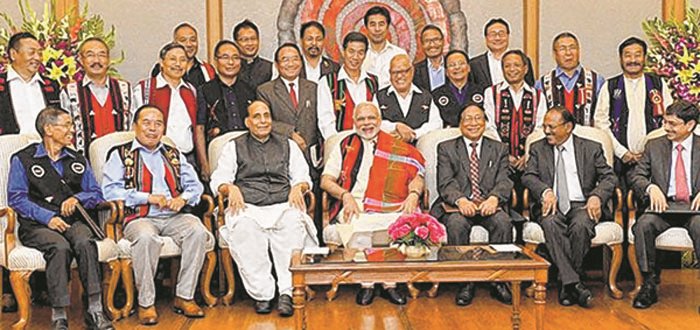Integration of Naga areas a must : NSA
Source: The Sangai Express
Imphal, September 01 2016:
The Naga Scholars' Association (NSA), New Delhi has adopted 12 resolutions with regard to the ongoing Indo-Naga political dialogue and called for the territorial integration of the contiguous Naga areas as part of the final agreement between the two entities.
In the same vein, the NSA said that a solution to the Naga issue should not be diluted and sabotaged on the pretext of protecting the territorial integrity of the neighbouring States.
The 12 resolutions were adopted during a three day In-House Workshop on 'Naga-India Framework Agreement' at Delhi University from August 13 to 15 .
In a statement issued to the press, the Naga Scholars' Association said that the workshop acknowledged the Framework Agreement signed between the collective leadership of the NSCN (IM) and the Government of India and after minutely discussing the issue at hand, adopted 12 resolutions.
|
Presenting the concerns and aspirations on the ongo- ing political dialogue, the NSA said, 'Territorial inte- gration of the contiguous Naga areas should be part of the settlement.
The rights and aspirations of the Nagas to live together under one Gov- ernment is a political right.' Stating that the Naga-India conflict is a geo-political is- sue, the NSA said that the settlement must be political, based on the rights and aspi- rations of the Nagas.
The NSA further said that the solution to the Naga-India political issue must be based on the 'unique history and situation of the Nagas' which has also been recognised by the Government of India.
Recalling the history of Naga Nationhood, the NSA said that the ideology of a modern sovereign Naga Na- tion rooted in the shared socio-cultural experience, po- litical aspiration and self determination was made known to the world for the first time when the Naga Club submitted a memoran- dum to Simon Commission in 1929. It was in pursuance of self determination that the Nagas under the Naga National Council (NNC) declared in- dependence on August 14, 1947, one day ahead of the Indian Independence on Au- gust 15, 1947. The declaration of Naga independence was reaffirmed in the Naga Plebiscite of 1951, it added.
Stating that the Nagas had never entered into any treaty for merger of annexation to any State, NSA said that the Nagas were divided through different divisive instruments such as the Treaty of Yandabo (1826) signed between Brit- ish India and the King of Burma, the 16 Point Agree- ment of 1960 and the Shillong Accord of 1975. Any agreement thus signed should accord Nagalim with legislative, executive, judici- ary and financial powers outside the purview of the Union of India, said NSA and added that the political structure of Nagalim should be democratic and representa- tive.
The other points touched in the 12 resolutions said that the Gov- ernment of India should not disrupt the unity of the Nagas in the process of the negotiation which will delay and derail the political settlement.
Stating that the long process of negotiation covering 19 years has created space for suspicion to arise on the sincerity and political will of the Government of India, NSA said that a solution to the issue must be sought within a specific time frame.








